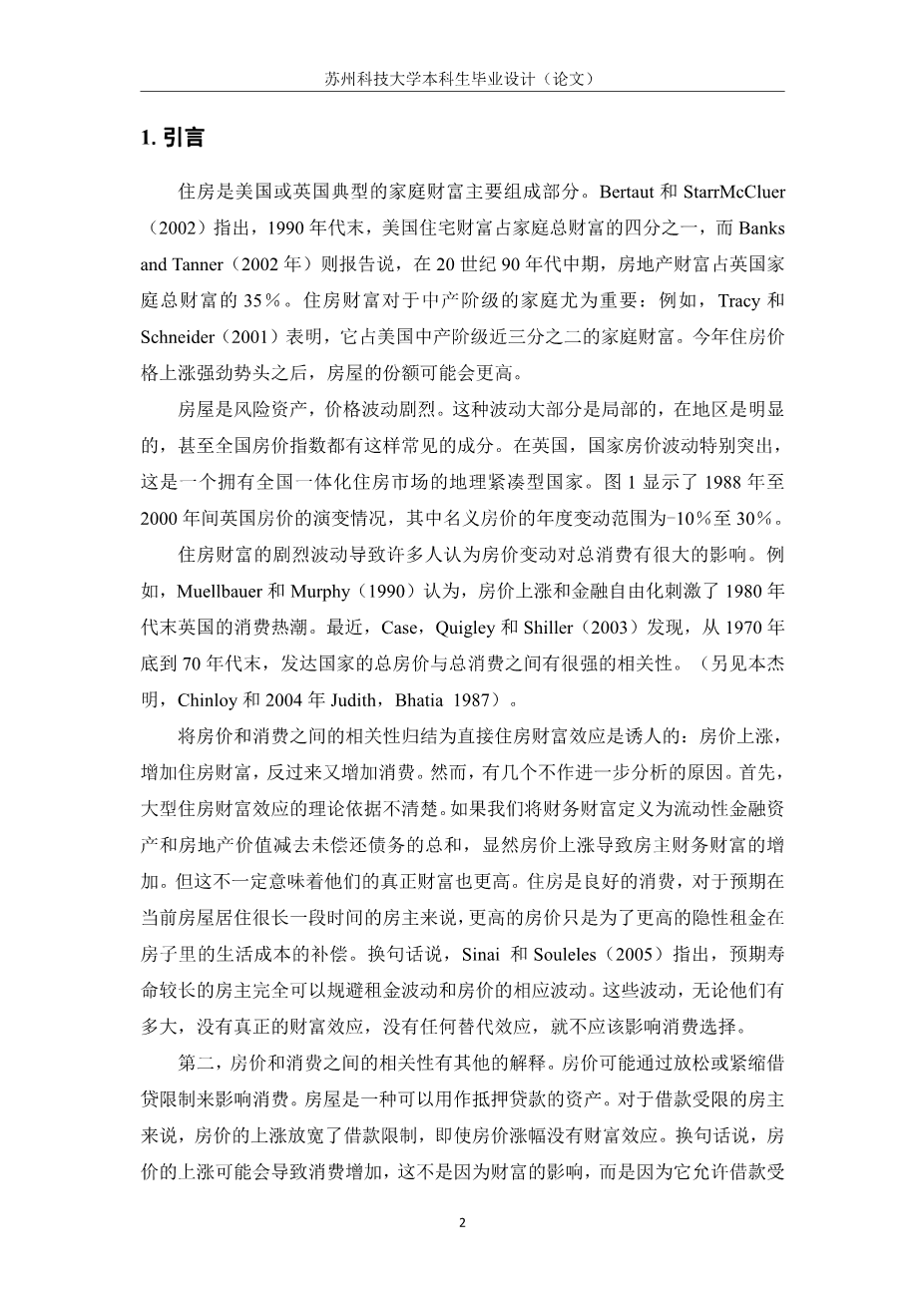HOW DO HOUSE PRICES AFFECT CONSUMPTION?
EVIDENCE FROM MICRO DATA
JY Campbell And JF Cocco
ABSTRACT
Housing is a major component of wealth. Since house prices fluctuate considerably over time, it isimportant to understand how these fluctuations affect households'consumptiondecisions. Risinghouse prices may stimulate consumption by increasing households' perceived wealth, or by relaxingborrowing constraints. This paper investigates the response of household consumption to houseprices using UK micro data. We estimate the largest effect of house prices on consumption for olderhomeowners, and the smallest effect, insignificantly different from zero, for younger renters. Thisfinding is consistent with heterogeneity in the wealth effect across these groups. In addition, we findthat regional house prices affect regional consumption growth. Predictable changes in house pricesare correlated with predictable changes in consumption, particularly for households that are morelikely to be borrowing constrained, but this effect is driven by national rather than regional houseprices and is important for renters as well ashomeowners, suggesting that UK house prices arecorrelated with aggregate financial market conditions.
Key words: houseprices,consumption, micro data,wealth effect
1. Introduction
Housing is the dominant component of wealth for the typical household in the United States or the United Kingdom. Bertaut and StarrMcCluer (2002) show that residential property accounted for about one quarter of aggregate household wealth in the US in the late 1990’s, while Banks and Tanner (2002) report that real estate accounted for 35% of aggregate household wealth in the UK in the mid 1990’s. Housing wealth is particularly important for middle-class households: Tracy and Schneider (2001), for example, show that it accounts for almost two-thirds of the wealth of the median US household. The share of housing is likely to be even higher today after several years of strong house price growth.
Houses are risky assets with volatile prices. Much of this volatility is local, but there is a common component to house prices that is visible in regional and even national house price indexes. National house price volatility is particularly striking in the UK, a geographically compact country with a nationally integrated housing market. Figure 1 shows the evolution of house prices in the United Kingdom between 1988 and 2000, a period in which annual changes in nominal house prices ranged from -10% to 30%.
The magnitude and volatility of housing wealth have led many to suggest that house price changes have significant effects on aggregate consumption. Muellbauer and Murphy (1990), forexample, argued that house price increases and financial liberalization stimulated a consumption boom in the UK in the late 1980’s. More recently Case, Quigley, and Shiller (2003) find a strong correlation between aggregate house prices and aggregate consumption in a panel of developed countries from the late 1970’s through the late 1990’s. (Seealso Benjamin, Chinloy, and Jud 2004 and Bhatia 1987).
It is tempting to attribute the correlation between house prices and consumption to a direct housing wealth effect: Increasing house prices increase housing wealth, which in turn increases consumption. There are, however, several reasons not to make this attribution without further analysis. First, the theoretical rationale for a large housing wealth effect is unclear. If we define financial wealth as the sum of liquid financial assets and the value of real estate minus debt outstanding, it is clear that an increase in house prices leads to an increase in homeowners’ financial wealth. But this does not necessarily mean that their real wealth is also higher. Housing is consumption good, and for a homeowner who expects to live in his current house for avery long time, a higher house price is simply compensation for a higher implicit rental cost of living in the house. In other words, as Sinai and Souleles (2005) point out, homeowners with a long expected tenure are perfectly hedged against fluctuations in rents and the corresponding fluctuations in house prices. These fluctuations, however large they may be, have no real wealth effect, and absent any substitution effects, should not affect consumption choices.
Second, there are alternative explanations for the correlation between house prices and consumption. House prices may affect consumption by relaxing or tightening borrowing constraints. Housing is an asset that can be used as collateral in a loan. For borrowing constrained homeowners, an increase in house prices relaxes borrowing constraints, even if there is no wealth effect associated with the house price increase. In other words, an increase in house prices may lead to an increase in consumption not because of a wealth effect, but because it allows borrowing constrained homeowners to smooth consumption over the life cycle (Ortalo-Magné and Rady 2001, Lustig and van Nieuwerburg 2004).
It is also possible that the correlation between house prices and consumption may be driven by an unobserved macroeconomic factor. For example house prices may respond to future income prospects, to which current consumption also responds provided that households are not borrowing constrained. Inotherwords, when house-holds become optimistic about the economy as a whole, the price of housing increases along with consumption (King 1990). Alternatively, financial liberalization may drive up house prices and stimulate consumption by relaxing borrowing constraints on all consumers (Attanasio and Weber 1994, Muellbauer and Murphy 1997).
The objective of this paper is to use household level data to distinguish among these alternative explanations for the house price-consumption correlation. Micro data can be helpful in several ways. First, micro data allow us to identi
剩余内容已隐藏,支付完成后下载完整资料


英语译文共 10 页,剩余内容已隐藏,支付完成后下载完整资料
资料编号:[486948],资料为PDF文档或Word文档,PDF文档可免费转换为Word
以上是毕业论文外文翻译,课题毕业论文、任务书、文献综述、开题报告、程序设计、图纸设计等资料可联系客服协助查找。


